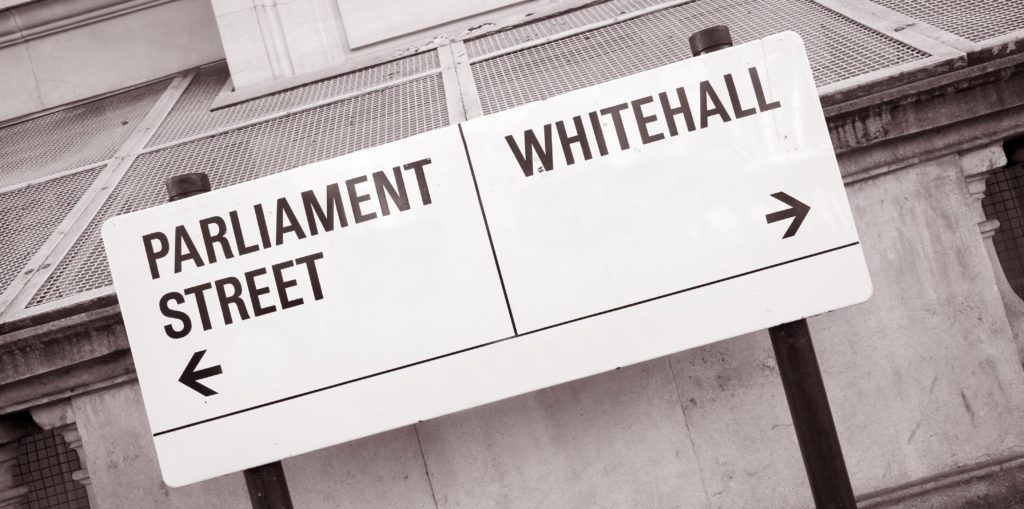Photo by Ron Sachs/CNP/ABACAPRESS.COM

‘Power devolved is power retained’ is an old Enoch Powell quote wheeled out by Scottish separatists when they want to have a pop at the UK. It’s a neat little phrase that contains a profound truth: it will sometimes suit the centre to derogate day-to-day control of important issues to subsidiary bodies, but only as long as it retains ultimate power. As the SNP would argue, the Scottish Parliament might appear to be a muscular and autonomous institution, but Westminster, a predominantly English parliament, could shut it down if it chose to.
That this is only true in theory – such a move would not end well – doesn’t disguise the fact that the British constitution is a mess, that it resembles an organogram drafted by a madman, and that this has always been so. It has evolved piecemeal over centuries to meet the crises, bulges and political fashions of the times. Outside the comment pages of The Daily Telegraph, it has rarely been the subject of the impassioned patriotic fervour its codified US equivalent attracts. And in truth this Heath-Robinson set-up has suited the UK, which is anyway a bodge job of four proud nations that often have differing cultural and philosophical expectations. For the system to work, there needs to be a lot of give.
Has that ever been truer than today? It is now twenty years since the biggest British constitutional upheaval for centuries, when Scots voted to create their own parliament in Edinburgh. Devolution, said Donald Dewar, the first First Minister, was a process not an event, and he was right. Since its inception there has been a steady transfer of further powers from Westminster to Holyrood as Scots have begun to enjoy making decisions for themselves. Brexit will deliver a whole new tranche of responsibilities in areas such as agriculture and fisheries.
The question is, where does it end? The independence referendum of 2014 delivered a barely decisive result of 55% for staying in the Union. In its aftermath, amid a spasm of tartan emotionalism, the popularity of the SNP surged and it has won every election since. Nicola Sturgeon would still like to hold a second referendum before the next devolved election in 2021. Has devolution only meant the drawn-out death, like a slow puncture, of the United Kingdom?
I focus on Scotland only because it provides us with a particularly dramatic example of the restlessness we currently witness across Western democracies. The old, top-down ways that saw strong central governments ruling at snail’s pace over subservient populaces – who were largely forced to take whatever gruel they were given no longer seem appropriate or durable. In our contemporary, fast-moving world of heavily politicised populations that are liberated, informed and engaged by social media, of big data that enables policy analysis and delivery at micro levels, of hyper-consumerism that expects responsive, individualised service from the state as well as the private sector, things must – and will – change.
If you have any doubts about this, look at research by Harvard’s Yascha Mounk and others, which has found public support for democracy is dropping, particularly among millennials. Alarming statistics abound: the share of Americans who say army rule would be a ‘good’ or ‘very good’ thing was one in 16 in 1995 but just one in 6 by 2014. Only 19% of US millennials thought it illegitimate for the military to take over if the government were incompetent, compared to 43% of older Americans. In Europe, 53% of older people thought a military takeover would be wrong, but only 36% of millennials.
Mounk finds the same trend across many long-established democracies. ‘In Germany, younger cohorts used to be reliably more pro-democratic than older ones. Now, both the young and the middle-aged express more authoritarian values than people did at similar life stages in the past. The picture is even less encouraging in the United Kingdom and the United States, where millennials surveyed today are markedly more favorable to having a “strong leader” than their parents’ generation was at the same life stage.’
There has also been a marked increase in young people identifying as extreme left or right, which helps explain the success of Jeremy Corbyn, the alt-right and some of the rather sinister populists who have popped up around the EU. For decades, the number of countries ranked ‘free’ in Freedom House’s annual survey rose steadily, but over the past decade it has charted a reversal – think of the authoritarian regimes in Poland, Hungary and Turkey, for example.
Yascha Mounk of Harvard University discusses falling support for Democracy with CNN’s Fareed Zakaria
Mounk writes that:
“Complacency has been the dominant response of Western elites to the looming threats of Brexit, of Donald Trump and of the rise of illiberal politics. The comforting assumption that the past will remain a reliable guide to the future — that countries would not vote for extreme candidates when they never have before, or indeed that core norms of liberal democracy wouldn’t come under attack where democracy has always been “the only game in town” — hasn’t worked out very well so far. Now is the time to stop being complacent.”
Easy to say, perhaps, but what is to be done? One of my greatest worries is that we spend so much time freaking out about Trump’s latest idiotic tweet or quasi-fascistic policy, or railing against Brexit and its consequences, or denouncing the Marxist inanities of Corbyn’s Labour, that we are failing to address the roots of their support. As we run around with our hands in the air, claiming arrogantly to be victims of our own success, nothing’s getting fixed, no intellectual heavy lifting is being done, we’re not preparing for what comes next. And what comes next could be even worse – imagine a competent Trump or a clever, persuasive Corbyn.
How did we end up here? Well, because a massive financial crash proved that the system was rigged against the little guy; that these enormous institutions and the super-rich individuals who ran them had slipped the bounds of democratic accountability, despite their systemic centrality; that governments, countries and even supranational organisations were toothless in the face of collapse.
We missed or ignored the fact that globalisation and liberal overreach was leaving too many behind, ostracised from and increasingly angry at the great, shiny project; we dismissed the valid bit of human nature that values belonging, whether to a local community, a nation, familiar mores and traditions, to somewhere recognisably home. We took down barriers and borders, we connected and built, we lined our own pockets and luxuriated in the innate goodness of our intentions, and, in the end, we got our ass kicked.
It seems to me the solutions to our crisis lie somewhere in that Enoch Powell phrase: power devolved is power retained. To stay together we need to loosen up, certainly in the UK. Individual and group identities have become too strong to tolerate remote, faceless government, not just from Brussels but from Westminster too. A radical programme of decentralisation and modernisation is needed. Extreme devolution to our cities and nations, to our councils and classrooms, would place power – and therefore accountability – closer to the people. Does anyone today look at a government minister and expect them to have all, or even any, of the answers? What a crazy idea. Why would they? How could they?
Reform of the Lords, which even a decade ago could be still taken for a gorgeous if stuffy piece of historical flummery but is now a national embarrassment, is becoming a priority – make it a senate of the regions capable of telling the Commons what’s what with a degree of democratic authority and regional awareness, and where mutual problems can be worked through.
Build up civic society by uniting its component parts in the pursuit of great, ambitious projects. Due to the impracticality of prime ministers and presidents agreeing and delivering on targets, the fight against climate change is now largely driven by sub-national administrations and voluntary partnerships between the private, third and state sectors. This should be a model for future participation and project management, and for how to cut out the malign influence of self-serving idiots like Trump.

If we are to re-establish the credibility of democracy and its institutions, of free markets and competition as the best routes to wealth creation, then people need a greater input into the process and a greater stake in the outcomes. We might scratch our heads at why our young people can look fondly on the kind of socialist economics that have caused calamity around the world, but we should also look at why the failings of our own approach have driven them in that direction. We have not created the society many of our compatriots, especially the most disadvantaged, the non-urban, the less educated, were promised or had a right to expect.
Our democracy is plodding, ineffective and distant, and therefore increasingly unlike the rest of our lives, which are immediate, professional and connected. If we want to avoid demagogues – perhaps better and therefore more dangerous demagogues – we need to tackle them at the roots. We need to be tough not just on Trump, but on the causes of Trump.










Join the discussion
Join like minded readers that support our journalism by becoming a paid subscriber
To join the discussion in the comments, become a paid subscriber.
Join like minded readers that support our journalism, read unlimited articles and enjoy other subscriber-only benefits.
Subscribe